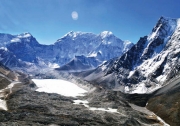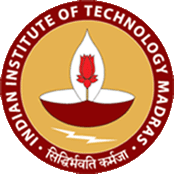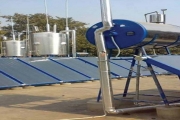/regions/political
Political
Review of current practices in determining user charges & incorporation of economic principles of pricing of urban water supply
Posted on 19 Dec, 2010 07:21 PMThis paper is an outcome of The Energy Research Institute's (TERI’s) study for the Ministry of Urban Development (MoUD) under the Ministry’s Centre of Excellence (COE) to “Review the existing guidelines of determination of user charges for water and sanitation services and to incorporate economic principles of pricing in urban water supply sector in India”.
Transdisciplinary method for water pollution and human health research – A working paper by Peter Mollinga
Posted on 19 Dec, 2010 06:21 PMThis paper discusses how to go about designing an interdisciplinary or transdisciplinary research project or programme, with ZEF’s research initiative on ‘water pollution and human health’ in India as the background of the presentation. A summary is given of Pohl and Hirsch Hadorn’s main arguments regarding ‘design principles’ for inter- and transdisciplinary research, and the basic tools they have developed for this are discussed in the context of ZEF’s ‘water pollution and human health’ research initiative.
Formation of glacial lakes in the Hindu Kush-Himalayas and Glacial Lake Outburst Flood risk assessment - A report by ICIMOD
Posted on 19 Dec, 2010 05:17 PM This report by ICIMOD contains an assessment of the threat facing the Hindu Kush-Himalayan region from the recent (post-1950s) and rapid formation of meltwater lakes on the surface or at the end of a large number of the region’s glaciers owing to current climate warming. Individual case studies of the catastrophic outburst (glacial lake outburst floods or GLOFs) from such glacial lakes are introduced.
This report by ICIMOD contains an assessment of the threat facing the Hindu Kush-Himalayan region from the recent (post-1950s) and rapid formation of meltwater lakes on the surface or at the end of a large number of the region’s glaciers owing to current climate warming. Individual case studies of the catastrophic outburst (glacial lake outburst floods or GLOFs) from such glacial lakes are introduced.
International Rivers is looking for Executive Director
Posted on 18 Dec, 2010 12:17 PMContent and Image Courtesy: International Rivers
International Rivers is accepting applications for the position of Executive Director. International Rivers seeks a proven, passionate, and dynamic Executive Director who has a keen sense of the urgency of the threats to rivers and communities – as well as the need for sustainable solutions – and is ready to take on this challenge with enthusiasm, strategic vision, creativity, and bold tactics.
Training program on open source 'Gram Panchayat QGIS', IIT Madras, Hyderabad
Posted on 18 Dec, 2010 11:37 AM Organizer: Indian Institute of Technology Madras (IIT)
Organizer: Indian Institute of Technology Madras (IIT)
Conceptual framework of South Asian water futures exchange - Commodity Vision
Posted on 18 Dec, 2010 12:15 AMIn this article published in Commodity Vision, the author presents the concept of the establishment of a 'futures market in water availability' in the context of the risk of water availability that Indian agriculture has been facing in the recent years.
With South Asian agriculture being dependent on the timely occurrence of the monsoons, any deviation from the scheduled arrival of the monsoon causes problems not only for the farmers, but also produces a threat to the food security of the region. However, the author argues that, there is no market in South Asia where users and investors exposed to water availability risk can effectively hedge against such a risk.
Mine the gap: Connecting water risks and disclosure in the mining sector – A report by the World Resources Institute
Posted on 17 Dec, 2010 10:43 PMThis paper by the World Resources Institute outlines potential water-related risks facing the mining industry and highlights important gaps in water-related disclosure. The purpose is to provide information, questions, and tools to help the financial community better evaluate water-related risks facing mining companies.
Water management across space and time in India – A working paper by the University of Bonn
Posted on 17 Dec, 2010 10:09 PMThis working paper by the University of Bonn attempts to give a spatial and temporal overview of water management in India. It traces how people and the successive regimes made choices across space and time from a wide range of water control and distribution technologies. The paper divides the water management in India into four periods –
- the traditional system of water management before colonial times;
- response from the colonial rulers to manage the complex socio-ecological system;
- large scale surface water development after independence; and
- finally, the small-scale community and market-led revolution.
Users handbook on Solar Water Heaters by the Ministry of New and Renewable Energy
Posted on 17 Dec, 2010 07:56 PM This user’s handbook on Solar Water Heaters by the Ministry of New and Renewable Energy (MNRE) in collaboration with the UNDP/UNEP/GEF Global Solar Water Heating Market Transformation Strengthening Initiative attempts to transform the solar water heating market in India.
This user’s handbook on Solar Water Heaters by the Ministry of New and Renewable Energy (MNRE) in collaboration with the UNDP/UNEP/GEF Global Solar Water Heating Market Transformation Strengthening Initiative attempts to transform the solar water heating market in India.
The wealth of waste: The economics of wastewater use in agriculture - A report by FAO
Posted on 17 Dec, 2010 07:36 PM This report by the Food and Agriculture Organisation (FAO) deals with the economics of wastewater use in agriculture. It presents an economic framework for the assessment of the use of reclaimed water in agriculture, as part of a comprehensive planning process in water resource allocation strategies to provide for a more economically efficient and sustainable water utilization.
This report by the Food and Agriculture Organisation (FAO) deals with the economics of wastewater use in agriculture. It presents an economic framework for the assessment of the use of reclaimed water in agriculture, as part of a comprehensive planning process in water resource allocation strategies to provide for a more economically efficient and sustainable water utilization.